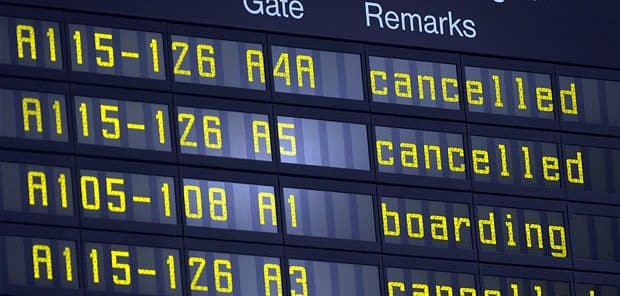Whoever said “It’s the journey, not the destination” never slept in an international airport terminal during a labor strike. There was even a film made starring Tom Hanks called “The Terminal” that was about this very phenomenon –and based on a true story! Being stranded in an airport is a travel nightmare that even if you’ve managed to avoid, you probably know someone that has been through.
People are sometimes surprised to hear that airlines are not required by law to reimburse you for any expenses you incur due to delayed or cancelled flights (yes, even due to a strike), though most will issue vouchers for hotels and meals while you’re delayed. Getting you to your destination in one piece is about all they are required to do, and if you have a complicated itinerary that depends on set timings, a strike could spell disaster for your trip.
Look. The vast majority of travelers will be fine. You’ll arrive at your destination without incident. But we here at CheapAir know it is better to be prepared. In the unlikely event you find yourself marooned in an unfamiliar international city as a labor strike threatens to ruin your vacation, all is not lost. We’d like to offer some pre-planning strategies and in-the-moment coping techniques to help smooth out the rough patches should you find yourself stuck in the airport. Up first, planning for an emergency.
1. Book your air travel with an airline that is part of an Alliance.
An Alliance is just a fancy word for a group of airlines that agree to cooperate. When the strike hits, airlines that have relationships with other airlines will have more options for you faster.
2. Book one airline from soup to nuts.
If you can do so, book your trip on one airline from start to finish rather than cobbling together your itinerary. Again, this is just a matter of streamlining the process when a crisis hits. It’s easier for the airlines to get you onto one of their flights faster. It’s common sense. Every airline is going to take care of their customers first.
3. When dealing with connecting flights, connect in a US city.
If you can fly to Los Angeles, New York, or San Francisco (for example) and then fly direct to your destination country, you eliminate the risk of getting stuck on the ground on foreign soil. This is not always feasible or even preferable, but if a strike is looming it could be your best bet for arriving at your final destination on time.
4. Get a travel agent.
If you’re considering a complex trip with a lot of moving parts, a good ol’ fashioned travel agent might be of value to you. A seasoned and savvy agent can help rebook, can offer alternatives during a crisis and may have insight and expertise you need at this critical time.
5. Consider train travel.
If travel is to Europe and you aren’t tied to a firm itinerary, take the time to research rail travel as a backup plan. A few alternatives via rail packed away with your travel docs can save you hours of stress on the ground (when everyone else will be scrambling as well). Western Europe is very well-networked by rail, and if you’ve got a plan B in place, you might be in a position to just hail a cab and head for the nearest train station.
6. Read the news.
Be aware of news in the country you are traveling to in the weeks leading up to your vacation. With so many technological tools at our fingertips, it’s quite simple to stay abreast of new developments these days. At a minimum, you should bookmark the U.S. State Department’s travel alerts web page, where they post news about strikes on the ground that could impact travelers to that country. You might also consider following the Office of Tourism for the countries you will be visiting on Twitter for more up –to-the-minute news.
7. Insure yourself.
Finally, travel insurance can provide additional peace of mind. A few tips for purchasing insurance that will protect your trip in case of air strikes:
Timing is everything. Make sure you buy a policy before a strike is underway. Most insurance policies will only cover you if the coverage was purchased prior to a strike’s announcement. Which leads to another important point…
Read the fine print. Thoroughly read through the policy before purchase. The policy should not exclude strikes (some of them do) and it should cover you for cancellation, interruption and delay benefits (delay benefits will help you with any out-of-pocket expenses such as hotel, cab fares, meals that might not be offered by the airline in the instance of a strike). You might want to engage a travel agent for assistance if policy language is not your cup of tea or you require some hand-holding. An experienced agent will have the skinny.
Know the limits to your coverage. Every policy will have limits so don’t plan on booking a suite at a 5-star hotel for the night without understanding the fine print. Most policies will set a limit to how much you can recoup per day, and some policies only cover you for a limited number of days (usually 2).
